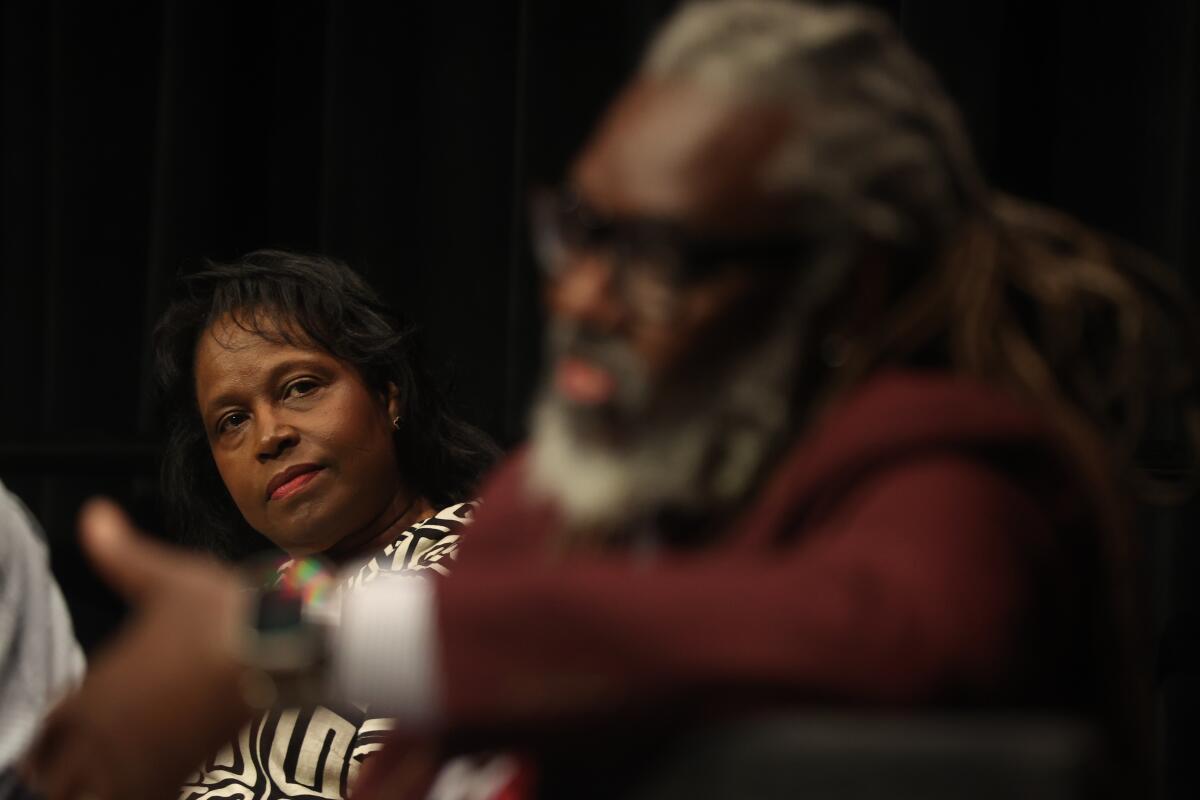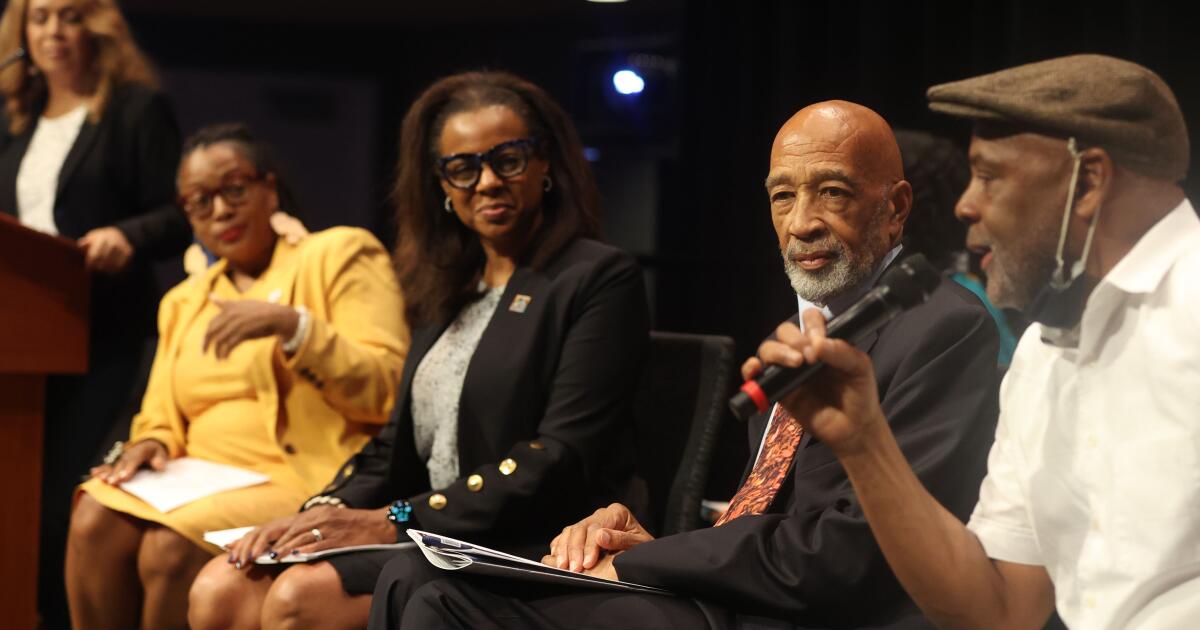Researchers at Cal State Northridge this week unveiled the first city-sponsored report on potential reparations to Black residents for the discriminatory harms they faced over the last 100 years.
Documenting Black Angelenos’ struggles from 1925 until today, “An Examination of African American Experiences in Los Angeles” is a 400-page report created by the Reparations Advisory Commission of the city’s Civil + Human Rights and Equity Department in collaboration with the university.
Six CSUN researchers interviewed and held focus groups with hundreds of residents, past and present, and analyzed laws and public policy over the last century to ascertain the effect of racial discrimination on descendants of enslaved African Americans.
“Despite the legal end of slavery, Black Angelenos continue to face systemic discrimination and inequity via legal segregation, enacted by both the state via the LAPD and the courts, as well as by the public, including groups like the Ku Klux Klan,” said researcher Marquita Gammage, a CSUN professor of Africana studies.
Twelve types of harms were documented: vestiges of slavery; racial terror; mental, physical harm and neglect; racism in environment and infrastructure; an unjust legal system; housing segregation; stolen labor and hindered opportunity; separate and unequal education; political disenfranchisement; pathologizing the Black family; control over creative cultural and intellectual life; and the wealth gap.
Researchers provided three possible reparation solutions for each harm listed. For housing segregation, Gammage says the city needs to “calculate the cost of housing inequity and launch compensatory efforts, fund and support programs that advance equity and homeownership opportunities, proactively address homelessness and housing insecurity among Black residents.”
Radio personality Dominique DiPrima speaks at the session.
(Michael Blackshire / Los Angeles Times)
About 80% of survey respondents endorsed home buyer assistance, appraisal protections to prevent overpaying and programs to address housing insecurity, according to the report. A total of 618 people were interviewed for this report, and more than half were women.
Most respondents expressed interest in monetary reparations, the researchers found.
Marisa Turesky from Mockingbird Analytics conducted a presentation on successful monetary reparations in U.S. cities — such as Evanston, Ill., which provided a $25,000 payment from a cannabis sales tax to Black residents who experienced housing discrimination between 1919 to 1969.
“Any reparations program really must prioritize Black people governing the money and deciding the policies surrounding its use,” Turesky said.
The Reparations Advisory Commission is expected to enter its fourth phase this fall, working to come up with recommendations to Mayor Karen Bass on how the city should approach Black reparations.
The commission was created in 2021 under then-Mayor Eric Garcetti to develop and recommend reparations for Black Angelenos by seeking opportunities to fund reparations, as well as identifying an academic partner to assist in developing the program.
As part of the research, CSUN and L.A. Civil Rights created a timeline of city policies that contributed to the erosion of Black rights from 1930 to the present.
At the report’s unveiling Tuesday night, W. Gabriel Selassie said he was stunned by his findings on the level of oppression and described some of the many ways it played out in everyday life.
“So, you walk outside, and you open up your car door as an L.A. police car drives by. You put your things into your car, and the police car backs up,” he said. “The next thing you know, you are in a jail cell … severely beaten. You have a court hearing and the judge dismisses the case. You have now lost your dignity, your pride, your time at work — you are essentially scarred for life. Those kinds of things that I saw, things that were documented by defense attorneys who were seeing this kind of racial injustice, and were so incensed by it, that they collected personal data, and eventually turned it over to news agencies or just kept it on file.”

Karin Stanford listens to Cal State Northridge professor W. Gabriel Selassie during the discussion.
(Michael Blackshire / Los Angeles Times)
Gammage described outright racial violence, “including lynching, the burning and destruction of homes, physical assaults … since the founding of Los Angeles.”
The report found that housing discrimination continues to disproportionately affect Black residents.
“We found that Proposition 14 of 1964 repealed the Rumford Fair Housing Act of 1963, and reinstated discriminatory practices in neighborhoods in Los Angeles that restricted Black people from living there saw greater equity growth,” Gammage said. “Segregation and housing policies historically limited black wealth accumulation through homeownership, where 68.3% of white households are homeowners versus only 41.5% of Black Angelenos are homeowners.”
Researchers found that 40,000 Black people living in Los Angeles were confined in Central Alameda, South Park and Watts in 1930 due to zoning practices, restrictive covenants and redlining policies that kept them from moving into new neighborhoods.
By the 1960s, L.A.’s Black population grew to 350,000 — with many families expanding into predominantly white neighborhoods in South Los Angeles.
However, racial integration never successfully occurred, resulting in areas of Black “ghettoization” across the city and beyond, not just in South L.A. but in Inglewood, Compton and Venice.
In the San Fernando Valley, Black families were mostly limited to Arleta and Pacoima.
“The vast San Fernando Valley region was always the area of LA most vehemently opposed to integration,” the timeline noted. “In 1970, while the Valley had a total population of nearly one million people, there were only about 18,000 Black people. These areas were older sections of the Valley where restrictive covenants were not in place or not enforced.”
Karin Stanford, CSUN professor of political science and Africana studies, said the report is a record of the wrongs facilitated by the city and provides steps toward reparations.
“Los Angeles is a city of Angels, and angels are messengers,” Stanford said. “And we are sending a message throughout the United States of America that we are standing strong in this space.”
